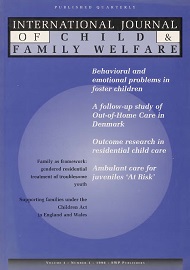Ambulant Care for Juveniles ‘At Risk’
Abstract
The fashion nowadays is to provide care for juveniles likely to develop developmental difficulties in the family home environment whenever possible. In the wake of this, all kinds of family intervention methods have emerged, e.g. Intensive Family Treatment, Video Home Training and Families First. Despite all this, however, the majority of juveniles in ambulant care still get assistance on a traditional or ‘classical’ basis. This article discusses the empirical characteristics of ‘classical’ ambulant care for juveniles in the Netherlands. Provisional conclusions are: the level of professional ambulant care that the institutions for voluntary and protected child care can offer is rather low in comparison with the professional care provided by the institutions for mental health care; the professional attitudes and treatment methods in ambulant child care are largely based on psycho-dynamic approaches; and the clinical impressions of care-providers and clients about the results of the care are too positive and in need of correction by objective effect measures.

